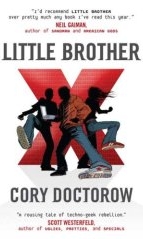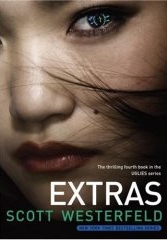Although I’ve always been eh about most scifi, I’ve grown increasingly fond of young adult science fiction and scifi focused on teens. There’s something fun in reading about teens running around trying to save the world. I can thank/blame Cory Doctorow for most of this because he’s the one who got me hooked on reading it. So I’m super super super stoked to announce that his first young adult scifi book is on the shelves.
 Little Brother is the story of a group of friends who are in the middle of an alternate reality game when a terrorist attack shakes San Francisco. They are whisked off by homeland security as potential terrorists; after a horrible few days, three of the four are released. And thus begins the tale of a group of teens who declare war on DHS. Beneath the fun YA story is a critique of the war on terrorism and a how-to guide that teaches teens how to be culture and tech hackers and jammers. It’s really geekalicious. I was fortunate enough to read the manuscript, but I’ve just ordered the book so that I can reread it. I really recommend checking it out – it’s quite fun and entertaining.
Little Brother is the story of a group of friends who are in the middle of an alternate reality game when a terrorist attack shakes San Francisco. They are whisked off by homeland security as potential terrorists; after a horrible few days, three of the four are released. And thus begins the tale of a group of teens who declare war on DHS. Beneath the fun YA story is a critique of the war on terrorism and a how-to guide that teaches teens how to be culture and tech hackers and jammers. It’s really geekalicious. I was fortunate enough to read the manuscript, but I’ve just ordered the book so that I can reread it. I really recommend checking it out – it’s quite fun and entertaining.
 I also have to give Cory kudos for introducing me to my favorite new teen book series – Uglies, Pretties, Specials, and Extras by Scott Westerfeld. Westerfeld’s series does the most awesomest job at breaking down contemporary society’s ideas of beauty, status, and reputation. In Tally Youngblood’s world, everything is about finally turning 16 and being allowed to become “pretty” through plastic surgery that makes you look as cool as everyone else who is 16. Being an ugly teenager sucks; being a pretty means getting access to everything and having all of the fun. Only, perhaps there might be a cost to being pretty?
I also have to give Cory kudos for introducing me to my favorite new teen book series – Uglies, Pretties, Specials, and Extras by Scott Westerfeld. Westerfeld’s series does the most awesomest job at breaking down contemporary society’s ideas of beauty, status, and reputation. In Tally Youngblood’s world, everything is about finally turning 16 and being allowed to become “pretty” through plastic surgery that makes you look as cool as everyone else who is 16. Being an ugly teenager sucks; being a pretty means getting access to everything and having all of the fun. Only, perhaps there might be a cost to being pretty?
While the first three focus on pushing against society’s valuation of the beautiful, the fourth introduces a new and “improved” world… where everyone in society is ranked based on how often people talk about them and “kickers” (aka bloggers) are obsessed with getting to the top. Needless to say, attention/reputation-based economies don’t come out the way that we might imagine them to be. (Translation: this series deconstructs both of our most “valuable” economies today – the economy of the beautiful AND the purportedly merit-based attention/reputation-economy. Sooooo good! And such fun world-saving kickass girl characters!)
For those of you who aren’t familiar with young adult sci fi, think of it as energizing brain candy. You can finish most YA books on a cross-country flight and they are far far far better than the movies that they show. And besides, they leave you with a youthful grin on your face.

right up the same ally is FEED by MT Anderson
http://www.amazon.com/Feed-M-T-Anderson/dp/0763622591
I am also a recent convert to YA Sci-Fi, thanks to T.C. Jessep. If you like the books mentioned here you have to check out her book ‘Emag of Efil’. It adds a cool element of satire to it’s comments on society. Can’t remember where it is online but I know it is still geing offered for free somewhere as a download. I am sure a quick google (can’t access here at work) of either the book title or the author will get you to the right place.
I am also a recent convert to YA Sci-Fi, thanks to T.C. Jessep. If you like the books mentioned here you have to check out her book ‘Emag of Efil’. It adds a cool element of satire to it’s comments on society. Can’t remember where it is online but I know it is still being offered for free somewhere as a download. I am sure a quick google (can’t access here at work) of either the book title or the author will get you to the right place.
Hi Danah,
Thank you for writing about YA Sci-Fi. One of the things I like about well-written YA Sci-Fi such as Scott Westerfelt’s work is that it provides an opportunity for “outlier” kids in middle school to connect to literature that speaks to them. The strong readers in the sixth grade have many options, but these books are written in a style that makes them accessible to students who are not necessarily advanced readers, but are advanced thinkers. These kids need support. They’re a group that doesn’t always get noticed, but they are special to me. Connecting to literature has a history of being a lifesaver to children who grow up to become extraordinary (which is not to say famous or notable) people.
I read your blog often, but never comment. So, this is also a bit of a fan letter–thank you for sharing your ideas, you’ve helped me shape some of mine more clearly and gotten me to push myself to spend some time with my thoughts on subjects I might prefer to just skim over. I particularly enjoyed your response to the Economist articles about social networking.
Thanks and good thoughts to you on your dissertation.
I suppose I’m dating myself by this comment, but I can recommend my own favorite teen-oriented SF from the fifties (or as they were called then – “juveniles”). Basically almost any of the “Winston Juveniles” (i.e. hardcover SF featuring teen protagonists published by Winston, and available at that time in many grade school or high school libraries). Plus, a special mention must go out for Robert Heinlein’s juveniles. There are too many to list comfortably without missing some, but off the top of my head – Have Space Suit Will Travel, Star Beast, Tunnel in the Sky, Starman Jones, Citizen of the Galaxy, Between Planets, etc. Of course, the teen characters featured in these were modeled on idealized teens of that day – not the present day, but the best of these are easily as timeless as a book like Tom Sawyer.
-Steve